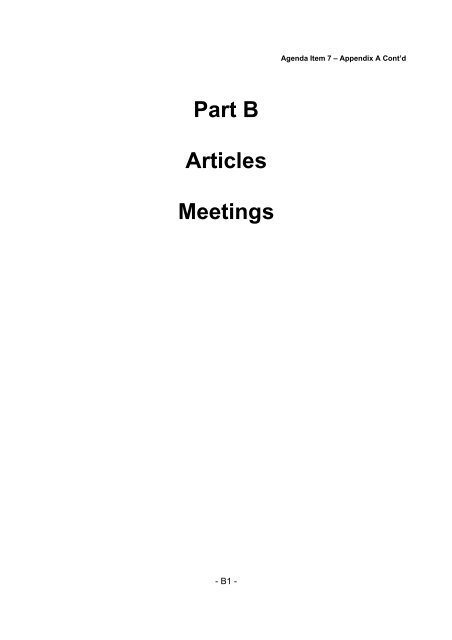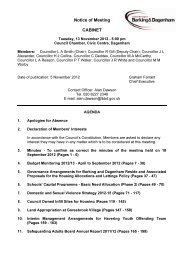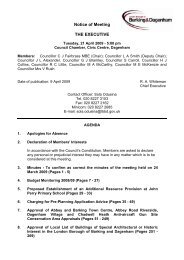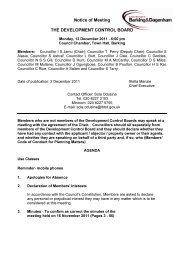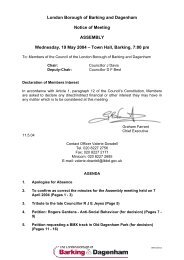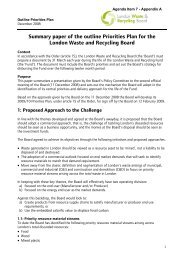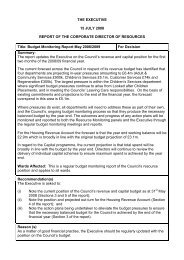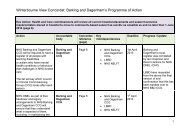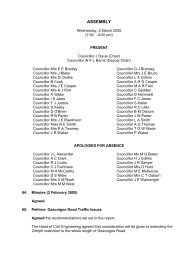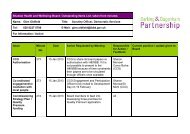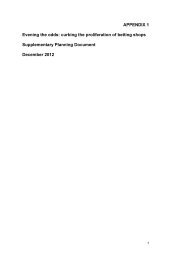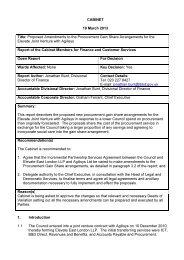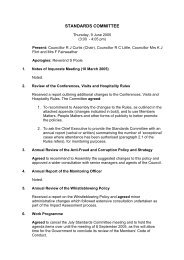Agenda Item 07 (ELWA Constitution 2006 - Part B) - Meetings ...
Agenda Item 07 (ELWA Constitution 2006 - Part B) - Meetings ...
Agenda Item 07 (ELWA Constitution 2006 - Part B) - Meetings ...
Create successful ePaper yourself
Turn your PDF publications into a flip-book with our unique Google optimized e-Paper software.
<strong>Part</strong> B<br />
Articles<br />
<strong>Meetings</strong><br />
- B1 -<br />
<strong>Agenda</strong> <strong>Item</strong> 7 – Appendix A Cont’d
1 Role<br />
ARTICLE 1<br />
AUTHORITY MEETINGS<br />
- B2 -<br />
<strong>Agenda</strong> <strong>Item</strong> 7 – Appendix A Cont’d<br />
1.1 Authority meetings are the main decision-making forum for <strong>ELWA</strong> matters. At these<br />
meetings, the Authority sets it’s overall corporate direction, policy framework and<br />
financial limits, within which all <strong>ELWA</strong>’s operations and policies are carried out.<br />
2 Functions<br />
2.1 There are certain matters which, by law, can only be carried out by the Authority.<br />
These are set out in <strong>Part</strong> C of the <strong>Constitution</strong>.<br />
2.2 All local choice functions that the Authority has decided it should undertake itself<br />
rather than to delegate to Officers are also set out in <strong>Part</strong> C.<br />
3 Membership<br />
3.1 The eight Members of the Authority (two appointed by each of the constituent<br />
Councils).<br />
4 Chair and Vice-Chair<br />
4.1 The Chair and Vice-Chair are appointed at each Annual General Meeting of the<br />
Authority.<br />
4.2 In the event of a casual vacancy occurring in either position, an appointment to fill the<br />
vacancy shall be made at the next ordinary meeting of the Authority.<br />
4.3 The meetings are controlled by the Chair who is responsible for:<br />
(a) upholding and promoting the purposes of the <strong>Constitution</strong>, and interpreting it<br />
(with the assistance of the Managing Director).<br />
(b) presiding over meetings of the Authority so that its business can be carried out<br />
efficiently and with regard to the rights of Members and the interests of the<br />
community.<br />
5 Employee Support<br />
5.1 The Managing Director is responsible for ensuring appropriate support for all Member<br />
meetings.
6 Accessibility<br />
- B3 -<br />
<strong>Agenda</strong> <strong>Item</strong> 7 – Appendix A Cont’d<br />
6.1 <strong>ELWA</strong> wishes to be as open as possible in its dealings and the press and public are<br />
encouraged to attend meetings. Occasionally there will be some matters which are<br />
legally restricted from the public eye, (for example, if discussing issues concerning a<br />
member of staff), but wherever possible issues are discussed in the open forum.<br />
Further details of the types of matters that are considered in private are contained in<br />
Article 2.<br />
7 Venues<br />
7.1 <strong>Meetings</strong> are generally held at the Civic Centre, Dagenham but may, from time to time,<br />
be held at an alternative venue within one of the four constituent boroughs.<br />
7.2 Public accessibility and appropriateness (particularly for people with limited mobility)<br />
are key factors in determining the suitability of venues for meetings.<br />
8 Calendar and Timing of <strong>Meetings</strong><br />
8.1 Where possible, meetings are programmed in advance. A programme of meetings for<br />
the coming municipal year is agreed by <strong>ELWA</strong> approximately four months prior.<br />
8.2 <strong>Meetings</strong> are usually held on Mondays, commencing at 1.00 p.m., and should last no<br />
longer than 3 hours.<br />
8.3 If business has not been concluded by this time, the proceedings may be extended for<br />
a reasonable further period, with the agreement of at least 75% of the Members<br />
present. Any unfinished business will be referred to the next meeting.<br />
9 Business at Ordinary <strong>Meetings</strong><br />
9.1 Ordinary meetings of the Authority will take place in accordance with the programme<br />
of meetings. The business carried out at Ordinary meetings may include the following:<br />
(a) elect a person to preside if the Chair and Vice-Chair are not present;<br />
(b) receive apologies for absence from Members;<br />
(c) approve the minutes of the last meeting;<br />
(d) consider and set the Authority’s overall priorities, plans, policy framework and<br />
related targets;<br />
(e) set the annual Levy on the constituent Councils and the Authority’s Capital and<br />
Revenue budgets. This includes:<br />
• the allocation of financial resources to different services and projects
- B4 -<br />
<strong>Agenda</strong> <strong>Item</strong> 7 – Appendix A Cont’d<br />
• proposed contingency and reserve funds and borrowing limits; and<br />
• the control of its capital expenditure.<br />
(f) consider and approve issues relating to the Authority’s integrated waste<br />
management service (IWMS) contract with <strong>ELWA</strong> Limited;<br />
(g) approve the Programme of <strong>Meetings</strong> and agree any changes;<br />
(h) make any changes to the appointment of representatives to outside bodies and<br />
partnerships;<br />
(i) agree any changes to the <strong>Constitution</strong> and associated Rules, Schemes, Codes<br />
and Protocols relating to the way in which the Authority operates;<br />
(j) oversee the management of the Authority, including holding all the component<br />
parts to account for their actions and performance;<br />
(k) receive and consider reports from officers as appropriate;<br />
(l) consider and approve appropriate statutory and non-statutory plans (e.g. the<br />
Best Value Performance Plan);<br />
(m) receive petitions (see paragraph 24);<br />
(n) consider motions;<br />
(o) deal with any other matters of significance or importance at the discretion of the<br />
Chair.<br />
The order of business will be in accordance with the agenda for each meeting. However, at<br />
the discretion of the Chair the order may be varied at the meeting. Any matters which are<br />
exempt from publication will generally appear later on the agenda.<br />
10 Annual General Meeting (AGM)<br />
10.1 The AGM of the Authority will be held in May orJune of each year.<br />
10.2 At each AGM, the first business shall be the appointment of a Chair and Vice-Chair for<br />
the coming year from amongst the membership. Once appointed, the newly<br />
appointed Chair shall preside at the meeting.<br />
10.3 To avoid any doubt, the person presiding at the commencement of the AGM shall be<br />
the preceding year’s Chair or, in the absence of the Chair, the Vice-Chair or, in the<br />
absence of both, another Member chosen by those present.<br />
10.4 Following the appointment of the Chair and Vice-Chair, the AGM will consider such<br />
other business as is included on the agenda.
11 Extraordinary General or Special <strong>Meetings</strong><br />
- B5 -<br />
<strong>Agenda</strong> <strong>Item</strong> 7 – Appendix A Cont’d<br />
11.1 An Extraordinary General (otherwise known as “special”) Meeting of the Authority may<br />
be called at any time by the Chair.<br />
11.2 Any two Members of the Authority may also, by signed requisition, request the Chair to<br />
call an Extraordinary General Meeting.<br />
11.3 If the Chair refuses to call an Extraordinary General Meeting of the Authority after a<br />
requisition for that purpose or without so refusing, does not call such a meeting within<br />
seven days of the requisition being presented to him, then on that refusal or the expiry<br />
of those seven days, as the case may be, any two Members of the Authority may then<br />
call an Extraordinary General Meeting.<br />
11.4 The arrangements for these meetings are the same as for ordinary meetings.<br />
12 Informal Member <strong>Meetings</strong><br />
12.1 From time to time, the Authority may arrange and hold Informal <strong>Meetings</strong> of all<br />
Members.<br />
12.2 These meetings are typically arranged in order that consideration can be given, in an<br />
all-Member forum, to one or more major issue affecting the Authority which requires<br />
deliberation prior to formal consideration being given at an Authority meeting.<br />
12.3 Informal meetings do not have any decision-making powers and the provisions of the<br />
Local Government (Access to Information) Act 1985 do not apply. In all other respects,<br />
the arrangements for these meetings are the same as for ordinary meetings.<br />
13 Quorum<br />
13.1 A quorum is the number of Members needed to enable a meeting to proceed. If a<br />
meeting is not quorate, the business will be adjourned to the next ordinary meeting or, if<br />
necessary, to an Extraordinary (special) meeting.<br />
13.2 An inquorate meeting can, if it feels there is any merit in doing so, discuss issues but<br />
strictly on an informal basis only. The minutes will make only brief reference to any<br />
such discussions.<br />
13.3 Subject to paragraph 45 of Schedule 12 of the Local Government Act 1972, no business<br />
will be transacted at a meeting of the Authority unless at least four Members of the<br />
Authority are present and the Members present comprise representatives of at least<br />
three of the constituent Councils.<br />
14 <strong>Agenda</strong> Papers<br />
14.1 Unless otherwise stated in the Articles for particular meetings, agenda papers will be<br />
in the Managing Director’s name and will indicate an appropriate contact for any<br />
queries.
- B6 -<br />
<strong>Agenda</strong> <strong>Item</strong> 7 – Appendix A Cont’d<br />
14.2 <strong>Agenda</strong>s, reports and minutes will generally be in an agreed corporate style, details of<br />
which are the responsibility of the Managing Director.<br />
14.3 Notices of meetings and agendas will be circulated in advance having regard (where<br />
appropriate) to the requirements of the Local Government (Access to Information) Act<br />
1985 or any subsequent legislation. In general, this means that the papers will be<br />
available at least five clear working days before a meeting.<br />
15 Reports<br />
15.1 Reports will provide reasoned options, where appropriate, ensuring that Members are<br />
made fully aware of all the implications and alternatives, and the advantages and<br />
disadvantages associated with each. Reports will also include, where appropriate, the<br />
views of other Members, Appointed Officers, constituent Council officers and/or<br />
experts (including outside representatives if relevant), together with the professional<br />
advice/recommendations of the appropriate lead officer.<br />
15.2 Reports will be in the name of the appropriate lead officer but will include the author as<br />
the point of contact for further information or queries.<br />
15.3 Late reports will generally not be allowed. If there are unavoidable, genuine<br />
circumstances, their consideration will be at the discretion of the Chair. The relevant<br />
lead officer will be required to justify the reason for special consideration in writing.<br />
15.4 Background papers will be made available for public inspection in accordance with<br />
statutory requirements. This responsibility lies with the relevant lead officer.<br />
16 Voting<br />
16.1 Decision-making is determined by a majority of the Members present at the meeting.<br />
16.2 Voting is generally by show of hands.<br />
16.3 The Chair, or other person presiding, will have a second and casting vote where votes<br />
for and against a proposal are equal.<br />
16.4 Any Member may ask for a vote to be recorded before it is taken provided they have<br />
the support of three other Members. Individual votes will then be taken by way of a<br />
roll call and recorded in the minutes. In this situation, Members will be asked to vote<br />
“for” or “against”; alternatively they may, if they wish, “abstain”.<br />
17 Minutes<br />
17.1 Minutes will be concise but sufficiently detailed to enable each matter discussed to be<br />
clearly understood by a lay person.<br />
17.2 Minutes will be circulated to Members with the agenda for the next meeting for<br />
confirmation as a correct record at that meeting.
- B7 -<br />
<strong>Agenda</strong> <strong>Item</strong> 7 – Appendix A Cont’d<br />
17.3 Minutes of all meetings will generally be confirmed as a correct record at the next<br />
scheduled meeting. If appropriate, or if necessary, this may be done at an earlier<br />
special meeting. The minutes will be signed by the Chair, or other person presiding at<br />
the meeting, when they are confirmed.<br />
17.4 Minutes will be made available for public inspection in accordance with statutory<br />
requirements.<br />
17.5 The minutes will be the formal record of attendance at meetings by Members.<br />
18 General Questions<br />
18.1 Questions relating to any matter on the agenda or otherwise may be raised at the<br />
meeting at the appropriate stage, subject to the discretion of the Chair who will ensure<br />
that questions are appropriate and relevant. All Members will be given an equal and<br />
fair opportunity to ask questions.<br />
18.2 Wherever possible, answers will be given at the meeting by the appropriate Member<br />
or officer. In the event that it is not possible to do so, a written response will be sent to<br />
the questioner, with copies to all Members, as soon as possible.<br />
19 Conduct/Disturbance at <strong>Meetings</strong><br />
19.1 It is the responsibility of the Chair to keep order at meetings.<br />
19.2 Members are expected to behave in a professional manner and to respect the ruling of<br />
the Chair.<br />
19.3 If a Member persistently misconducts him or herself by behaving irregularly,<br />
offensively or improperly, or by disregarding the Chair and knowingly or deliberately<br />
obstructing the business, the Chair, or any other Member, may move that the Member<br />
no longer be heard. If seconded, the matter will be put to the vote and determined<br />
without discussion. The Member concerned cannot vote in these circumstances.<br />
19.4 If the Member concerned continues his/her misconduct, the Chair may either move<br />
that the Member leaves the meeting or that the meeting be adjourned for a period<br />
which the Chair feels will be appropriate to contain the problem. Such motions must<br />
be seconded and determined as above.<br />
19.5 If a member of the public interrupts a meeting, the Chair will ask them not to do so and<br />
warn them that if the interruption continues, the person will be required to leave. If the<br />
person continues to interrupt, the Chair can order him/her to leave the meeting. If<br />
necessary, the assistance of staff will be sought to escort the person off the premises.<br />
19.6 Where there is a general disturbance in any part of the room where a meeting is being<br />
held, the Chair can, at his/her discretion, order that it be cleared. If the general<br />
disturbance is considered by the Chair to be such that the meeting cannot reasonably
- B8 -<br />
<strong>Agenda</strong> <strong>Item</strong> 7 – Appendix A Cont’d<br />
continue, he/she shall adjourn the meeting for a certain period or until another day,<br />
whichever is felt to be most appropriate in the circumstances.<br />
19.7 The Police will be called to assist in any situation, if necessary.<br />
20 Members' Interests<br />
20.1 Having regard to statutory requirements and Members' Codes of Conduct, if a<br />
Member has a personal interest in a matter for consideration (i.e. one which affects<br />
the Member more than most other people in the area) they must declare it and say<br />
what that interest is before any meeting where the issue is to be discussed or as soon<br />
as it comes to light. However, they can still take part in the meeting and vote unless<br />
the personal interest is also a prejudicial interest (see below).<br />
20.2 A Member with a prejudicial interest in any matter (i.e. where a member of the public<br />
would view the personal interest as being so significant that it is likely to prejudice the<br />
Member's decision) must declare what the interest is (if they have not already done<br />
so) and withdraw from the meeting (by leaving the room).<br />
20.3 The minutes will record the declaration and, if appropriate, that the Member left the<br />
meeting. A record will also be kept in a book provided for this purpose by the<br />
Managing Director for public inspection at <strong>ELWA</strong>’s offices.<br />
21 Speaking by the Public at <strong>Meetings</strong><br />
21.1 Members of the public will not normally be allowed to speak at meetings. However,<br />
members of the public may speak on a specific issue at the discretion of the Chair.<br />
22 Press Briefings<br />
22.1 <strong>ELWA</strong> wishes to conduct its business in an open and informative manner. Where<br />
considered appropriate, press briefings will be arranged through the Managing<br />
Director to explain particularly important or sensitive issues and to give an opportunity<br />
for questions to be asked.<br />
23 Photography, Live Broadcasts and Tape Recordings of Proceedings<br />
23.1 The Chair has discretion to allow photographs to be taken or for proceedings to be<br />
transmitted by television, video recording, radio broadcast or any other means, if this<br />
is felt to be appropriate.<br />
24 Petitions<br />
24.1 All petitions sent to the Authority which contain at least 50 signatories from separate<br />
households will be reported to the Authority.<br />
24.2 Before a petition is presented to the Authority, the Managing Director will arrange an<br />
informal meeting to discuss the petition and appropriate action in response. The lead<br />
petitioners and appropriate Members will be invited to attend. The Managing Director
- B9 -<br />
<strong>Agenda</strong> <strong>Item</strong> 7 – Appendix A Cont’d<br />
may attend the meeting himself and/or be represented by a relevant officer. The<br />
Managing Director will then prepare a report to accompany the submission of the<br />
petition to the Authority; this will set out the outcome of the informal meeting and detail<br />
any action which has been taken, or which is proposed, in response to the petition.<br />
24.3 The lead signatory will be invited to speak at the Authority meeting for the purpose of<br />
introducing the petition should he/she wish - a maximum of five minutes will be<br />
allowed for this.<br />
24.4 Petitions with fewer than 50 signatories will be accepted by the Managing Director but<br />
not reported to the Authority.<br />
25 Urgent Action<br />
25.1 In exceptional circumstances and where delay would be prejudicial to the interests of<br />
the Authority, Appointed Officers are authorised to take action which is not otherwise<br />
delegated to them subject to:-<br />
(a) consultation with the Chair and the Vice-Chair. Should either the Chair or<br />
Vice-Chair be unavailable, then consultation with the other shall be sufficient.<br />
In the event that the necessary decision cannot be obtained through this<br />
procedure within 24 hours, the matter may be dealt with provided that at least<br />
two other Members are consulted;<br />
(b) compliance with the <strong>Constitution</strong> and, in particular, relevant Rules where<br />
appropriate; and<br />
(c) the action taken being reported to the next appropriate meeting.<br />
26 Inspection of Documents by Members<br />
26.1 A Member of <strong>ELWA</strong> may inspect any document that is in the possession of, or under<br />
the control of, the Authority provided that either:<br />
(a) the Member can justify that it is reasonably necessary to perform his/her duties<br />
as a member of the Authority, or<br />
(b) the document contains material relating to any business to be transacted or<br />
which has been transacted at a meeting. They are not, however, entitled to<br />
inspect any document if it relates to a matter in which the Member is<br />
professionally interested or in which he/she has a direct or indirect financial<br />
interest in accordance with the statutory interpretation.<br />
26.2 If the Managing Director is of the opinion that the document in question is not required<br />
to be open to inspection under the provisions of the Local Government (Access to<br />
Information) Act 1985 (exempt information not to be provided to Members), a Member<br />
will not be able to inspect the document.
- B10 -<br />
<strong>Agenda</strong> <strong>Item</strong> 7 – Appendix A Cont’d<br />
26.3 This provision does not entitle the Managing Director to refuse a Member access to<br />
documents which they have a legal right to inspect.
27 Confidentiality<br />
- B11 -<br />
<strong>Agenda</strong> <strong>Item</strong> 7 – Appendix A Cont’d<br />
27.1 Where the contents of any document are expressed to be restricted from publication,<br />
Members and officers must respect such confidentiality.<br />
28 Attendance at <strong>Meetings</strong> by Constituent Borough Councillors<br />
28.1 A Councillor who is a member of a constituent Council but not appointed to <strong>ELWA</strong> may<br />
attend any meeting of the Authority but they cannot vote at that meeting. They may,<br />
however, take part in the discussion and may stay for the whole meeting unless asked<br />
to leave for specific reasons that will be explained by the Chair and recorded in the<br />
minutes.<br />
28.2 <strong>Agenda</strong> papers for meetings will be circulated to any Councillor at their request subject<br />
to the conditions set out in paragraph 26 and to the restrictions around reports dealing<br />
with certain human resource issues (see “Protocol - Dealing with Human Resource<br />
Issues” at Appendix B).<br />
29 Implementing Decisions<br />
29.1 Decisions of the Authority can be acted upon after the meeting subject to any<br />
restriction placed at the time.<br />
30 Requirement to Attend <strong>Meetings</strong><br />
30.1 If a Member fails to attend one of three consecutive meetings of the Authority, unless<br />
the failure was due to a reason approved by the Authority, the Authority will<br />
recommend to the relevant constituent Council that the Member be replaced and not<br />
considered for re-appointment by the Council to the Authority for a period of at least<br />
two years.<br />
31 Sealing<br />
31.1 The Common Seal of the Authority shall be kept in a safe place in the custody of the<br />
Managing Director or his/her nominated postholder.<br />
31.2 The Seal shall be attested by the Managing Director or his/her nominated postholder<br />
and a register kept recording details of all documents sealed.
1 Scope<br />
ARTICLE 2<br />
ACCESS TO INFORMATION<br />
1.1 These rules apply to all meetings of the Authority.<br />
2 Additional Rights and Information<br />
- B12 -<br />
<strong>Agenda</strong> <strong>Item</strong> 7 – Appendix A Cont’d<br />
2.1 These rules do not affect any more specific rights to information contained elsewhere<br />
in this <strong>Constitution</strong> or the law.<br />
3 Rights to Attend <strong>Meetings</strong><br />
3.1 Members of the public and press are welcome to attend all meetings, subject only to<br />
the exceptions set out later in this Article. The Authority will do all that it can to<br />
minimise such exceptions so that it can have an open debate in public on most issues.<br />
4 Notice of <strong>Meetings</strong><br />
4.1 The Authority will give at least five clear days notice of any meeting by posting details<br />
of the meeting at <strong>ELWA</strong>’s offices at Arden House, 198 Longbridge Road, Barking<br />
(known as "the designated offices") and, if the meeting is to be held at an alternative<br />
location, at the building where the meeting is to be held. If a meeting has to be called<br />
at short notice, details will be posted at the earliest opportunity - such instances<br />
should, however, be rare and only in cases of absolute urgency.<br />
5 Access to <strong>Agenda</strong> and Reports before <strong>Meetings</strong><br />
5.1 The Authority will make copies of the agenda and reports of meetings open to the<br />
public available for inspection at the designated offices at least five clear days before<br />
the meeting. If an item is added to the agenda later, the revised agenda will be open<br />
to inspection at the time the item is added. Where reports are prepared after the<br />
notice of the meeting has been sent out, each report will be made available to the<br />
public as soon as it is completed and has been sent to Members.<br />
6 Supply of Copies<br />
6.1 On request, the Authority will supply copies of:<br />
(a) any agenda and reports which are open to public inspection;<br />
(b) any further statements or particulars necessary to indicate the nature of the<br />
items in the agenda; and
- B13 -<br />
<strong>Agenda</strong> <strong>Item</strong> 7 – Appendix A Cont’d<br />
(c) any other documents open to public inspection and supplied to Members in<br />
connection with an item.<br />
6.2 These papers will be available free of charge to any person at any meeting of the<br />
Authority to which the papers relate, or for a reasonable charge when requested at<br />
any other time.<br />
7 Access to Minutes and Reports after <strong>Meetings</strong><br />
7.1 The Authority will make available copies of the following documents for six years after<br />
a meeting:<br />
(a) the minutes of the meeting or record of decisions taken, together with reasons,<br />
excluding any part of the minutes when the meeting was not open to the public<br />
which discloses exempt or confidential information (as defined in paragraph 10<br />
below);<br />
(b) a summary of any proceedings not open to the public where the minutes open to<br />
inspection do not provide a reasonably fair coherent record;<br />
(c) the agenda for the meeting; and<br />
(d) reports related to items where the meeting was open to the public.<br />
8 Background Papers<br />
8.1 Every report will list those documents relating to the subject matter of the report,<br />
which, in the author's opinion, (a) disclose any facts or matters upon which the report,<br />
or part of it, was based and (b) have been relied upon to a material extent in preparing<br />
the report.<br />
8.2 This will not include published works or those that disclose exempt or confidential<br />
information.<br />
8.3 Background papers are available for public inspection for four years after the date of<br />
the meeting and copies may be requested for a reasonable charge from the Managing<br />
Director.<br />
9 Summary of Public's Rights<br />
9.1 The public has the right to attend meetings and to inspect and copy documents.<br />
Those rights are summarised as follows:-<br />
9.2 Members of the public may -<br />
(a) attend meetings and speak with the permission of the Chair or in accordance<br />
with any special procedures for the meeting concerned (e.g. lead petitioner);<br />
(b) inspect agendas for each of the meetings;
- B14 -<br />
<strong>Agenda</strong> <strong>Item</strong> 7 – Appendix A Cont’d<br />
(c) inspect minutes of the meetings once they have been confirmed as a correct<br />
record;<br />
(d) inspect a list of background papers used to compile the reports attached to each<br />
agenda; and<br />
(e) make copies, or ask for copies of the whole or part of any such document open<br />
to inspection.<br />
9.3 Members of the public may not, however -<br />
(a) have access to some documents which, by law, are exempt from publication (i.e.<br />
private and confidential reports).<br />
(b) stay at a meeting when private and confidential reports are being discussed - a<br />
resolution will be passed at the meeting requiring press and public to leave.<br />
(c) take photographs at meetings nor record or transmit the proceedings (unless the<br />
Chair chooses to allow these actions in which case this will be announced).<br />
10 Exclusion of Access by the Public to <strong>Meetings</strong><br />
10.1 Confidential Information - The public has (legally) to be excluded from meetings<br />
whenever it is likely that confidential information will be disclosed.<br />
Confidential information means information given to the Authority by a Government<br />
Department on terms which forbid its public disclosure or information which cannot, by<br />
Court Order, be publicly disclosed.<br />
10.2 Exempt Information - The public may be excluded from meetings whenever it is likely<br />
that exempt information will be disclosed.<br />
Exempt information means any of the paragraphs of <strong>Part</strong> I of Schedule 12A to the<br />
Local Government Act 1972 as detailed in Appendix A to this <strong>Part</strong>.<br />
10.3 Where the meeting will determine any person's civil rights or obligations, or adversely<br />
affect their possessions, Article 6 of the Human Rights Act 1998 establishes a<br />
presumption that the meeting will be held in public unless a private hearing is<br />
necessary for one of the reasons specified in that Article.<br />
11 Exclusion of Access by the Public to Reports<br />
11.1 If the author thinks fit, the Authority may exclude access by the public to reports that in<br />
his/her opinion relate to items during which, in accordance with above, the meeting is<br />
likely not to be open to the public. Such reports will be marked "Not for Publication"<br />
and the agenda will explain the category of information likely to be disclosed.
- B15 -<br />
<strong>Agenda</strong> <strong>Item</strong> 7 – Appendix A Cont’d
1. Information relating to any individual.<br />
Exempt Information<br />
2. Information which is likely to reveal the identity of an individual.<br />
- B16 -<br />
<strong>Agenda</strong> <strong>Item</strong> 7 – Appendix A Cont’d<br />
APPENDIX A TO ARTICLE 2<br />
3. Information relating to the financial or business affairs of any particular person<br />
(including the authority holding that information).<br />
4. Information relating to any consultations or negotiations, or contemplated consultations<br />
or negotiations, in connection with any labour relations matter arising between the<br />
authority or a Minister of the Crown and employees of, or office holders under, the<br />
authority.<br />
5. Information in respect of which a claim to legal professional privilege could be<br />
maintained in legal proceedings.<br />
6. Information which reveals that the authority proposes:-<br />
(a) to give under any enactment a notice under or by virtue of which requirements<br />
are imposed on a person; or<br />
(b) to make an order or direction under any enactment.<br />
7. Information relating to any action taken or to be taken in connection with the<br />
prevention, investigation or prosecution of crime.<br />
-oOo-
- B17 -<br />
<strong>Agenda</strong> <strong>Item</strong> 7 – Appendix A Cont’d<br />
APPENDIX B TO ARTICLE 2<br />
PROTOCOL<br />
DEALING WITH HUMAN RESOURCE ISSUES<br />
When Members consider items about the people that are employed solely on behalf of the<br />
Authority (e.g. <strong>ELWA</strong> full-time employees), the Authority must be mindful of a number of<br />
matters:<br />
• Employees have rights, on an individual basis, to be treated fairly. (This includes<br />
expecting the Authority to maintain confidentiality about an individual's personal and<br />
employment details).<br />
• Information relating to employees is often confidential in nature and should not be<br />
available widely throughout the organisation (at Member or officer level). Only those<br />
who need to know should know.<br />
• Members should have the opportunity to consider, debate and decide upon issues<br />
without managers/officers being present.<br />
• A variety of decisions on Human Resource (HR) matters, including the fair treatment of<br />
people by their employer, are subject to external scrutiny.<br />
For these reasons:<br />
• Written information to Members on HR management and/or personal HR matters which<br />
address employee issues in respect of an individual, should be restricted to relevant<br />
Members and appropriate officers. This information should not be included as part of<br />
the usual circulation for a report.<br />
• The meeting considering these matters should be conducted in private and those people<br />
who should not be in attendance should be asked to leave the meeting.<br />
Guidelines:<br />
If there is any doubt as to who should receive copies of the report and who should be<br />
allowed to remain at the meeting, the Managing Director should be consulted.<br />
The Managing Director will have access to all reports and all meetings of Members about<br />
Human Resource matters.<br />
The Managing Director may delegate some matters to an Appointed Officer, the relevant<br />
Borough Personnel Manager (from the employing Council) and/or Legal Officer, who will<br />
have access to appropriate reports and meetings.<br />
Where there are any financial implications to be considered by the Authority, the Finance<br />
Director will have access to appropriate reports and meetings.<br />
There may be meetings where it is appropriate to invite representatives of the Trades
- B18 -<br />
<strong>Agenda</strong> <strong>Item</strong> 7 – Appendix A Cont’d<br />
Unions and cognizance must be given to this. If there is any doubt, the Managing Director<br />
should be consulted.


